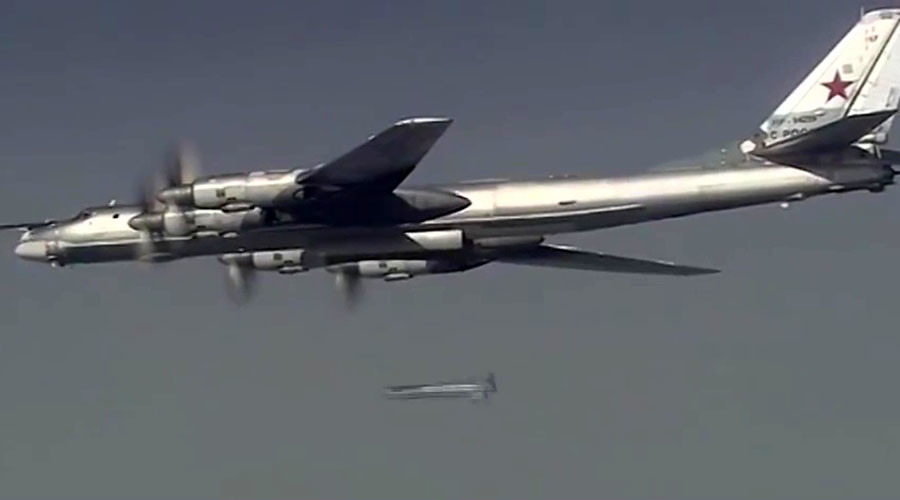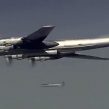
Putin Accuses Islamic State of Downing Passenger Jet as Strategic Bombers Pound Syria
Publication: Eurasia Daily Monitor Volume: 12 Issue: 211
By:

In an apparent sudden about-face, the Kremlin has accused the Islamic State (IS) of planting a bomb onboard Russian Metrojet Flight 9268, which disintegrated in midair after takeoff from the Egyptian resort city of Sharm el-Sheikh, on October 31, killing all 224 people on board, mostly Russian tourists. Previously the Russian authorities played down the possibility of foul play being the cause of the Airbus A321 charter passenger jet crash and insisted that all possible versions must be explored, including technical malfunctions. Claims of responsibility by IS-affiliated Salafi extremists operating in the Sinai were disregarded as unsubstantiated. The Kremlin’s spokesman Dmitry Peskov insisted: “There is no connection between the Russian bombing operation in Syria and the Metrojet Flight 9268 crash” (Interfax, November 3). On November 16, after the G20 economic summit in Antalya, Turkey, President Vladimir Putin told journalists: “The jet crash is a terrible tragedy no matter what the cause. We know about all the different versions and all are being considered. The final decision will be based on forensic evidence of possible explosives residue on the jet’s debris and passenger belongings” (Kremlin.ru, November 16).
While seemingly continuing to deny the evidence of foul play, the Russian president was, in fact, carrying out a disinformation maneuver aimed at gaining tactical military surprise: As Putin was talking, Russian heavy bombers were ending preparations to attack targets in Syria in revenge for the Metrojet Flight 9268 crash. That same day, in late evening of November 16, after returning to Moscow, Putin met in the Kremlin with his defense minister, Army-General Sergei Shoigu; the first deputy defense minister and chief of the general staff, Army-General Valery Gerasimov; Federal Security Service (FSB) head Alexander Bortnikov; the head of the Foreign Intelligence Service (SVR), Mikhail Fradkov; and Foreign Minister Sergei Lavrov. In footage released by the Kremlin press service, Bortnikov told the somber gathering: “Explosives residue was found on the jet’s debris and passenger belongings.” The device that destroyed Metrojet Flight 9268, according to Bortnikov, was “equivalent to 1 kilogram of TNT.” Putin declared: the perpetrators will be sought out and “severely punished” (“pokarat”). Russia was attacked and will exercise its right to self-defense. Putin ordered to “intensify the bombing campaign in Syria,” apparently directly linking the downing of Metrojet Flight 9268 with the Islamic State and Russian actions in Syria (Kremlin.ru, November 17).
The report that Russia had declared the Metrojet Flight 9268 crash to be the result of an IS-connected terrorist attack, footage of the November 16 Kremlin meeting, as well as Putin’s order to “intensify” the Syrian bombing campaign were all released by the Kremlin press service in late morning of November 17—many hours after Russian heavy bombers went into action. In addition to the 30 or so Russian tactical bombers and attack jets that are bombing targets in Syria from an airbase in Latakia, on the Syrian Mediterranean coast, some 23 heavy long-range bombers joined the fray, on November 17. Around 12 long-range supersonic Tu-22M3 “Backfire” bombers took off from an airbase in Mozdok, in North Ossetia in the North Caucasus, flew over 4,500 kilometers to Syria to bomb IS targets in Raqqa, and then returned home. Later, six Tu-95MS “Bear” and five Tu-160 “Blackjack” strategic bombers (from a base in Engels, east of the Volga River in the Saratov oblast) fired 34 long-range cruise missiles at targets in Idlib and Aleppo provinces (TASS, November 17). The Tu-22M3 “Backfire” bombers bombed Raqqa during the night—from 0500 to 0530 hours—to minimize threat from ground fire. The strategic bombers fired cruise missiles later in daylight, without entering hostile airspace.
The bombing missions continued on November 18: Tu-22M3 bombers repeated a night attack on Raqqa province, and Tu-160 “Blackjack” bombers reportedly fired an additional 12 cruise missiles at targets in Idlib and Aleppo provinces, without leaving Russian airspace (Interfax, November 18). The Tu-22M3 was developed during the Cold War as a highly specialized naval supersonic jet, designated to destroy the United States’ carrier battle groups with supersonic nuclear-armed cruise missiles. During the Russian invasion of Afghanistan, in the 1980s, Tu-22M3 bombers were used to attack rebel mujahidin positions; there, they proved to be an inaccurate, though heavy-payload weapon. The Tu-22M3’s radar targeting device is designed to distinguish ships at sea, but not to pinpoint targets on land. This heavy bomber cannot do close-air-support missions. In footage released by the Russian defense ministry, the Tu-22M3 aircraft are being loaded with “dumb” munitions, apparently to carpet-bomb presumed IS targets in Raqqa province, where there are no forces loyal to Syrian President Bashar al-Assad operating (Mil.ru, November 17).
More accurate Russian cruise missiles have been used in Idlib and Aleppo provinces, which are not Islamic State strongholds, and where ground battles are continuing between the Syrian opposition and al-Assad loyalists. Most of the cruise missiles were apparently Kh-555s—a conventional version of the Soviet nuclear-tipped Kh-55, with a range of some 3,000 kilometers. Apparently, the Russian military also used the occasion to test in action their newest Kh-101 cruise missile, with an extended range of some 5,500 kilometers, though such a range was not required to hit targets in Syria (Rbc.ru, November 18). The joint full capacity of the strategic bombers reportedly in the air on November 17 is some 96 cruise missiles (Tu-160s can carry 12 and Tu-95MSs—6), but only 34 were actually fired. The planes went into action loaded to only about one-third of their overall capacity. These heavy bombing and cruise missile strikes, therefore, seem to have been primarily a PR exercise and a test of battle-readiness that will have little lasting military consequence. Cruise missiles are highly expensive and their supply could be limited.
After the IS-connected terrorist attack on Paris, on November 13, Moscow renewed calls for a “broad antiterrorist coalition” (Interfax, November 17). Putin ordered the Russian military and navy to consider their French counterparts attacking the Islamic State in Syria to be “allies” (TASS, November 17). On November 20, a joint session of both houses of parliament may convene in Moscow, at which Putin will be able to announce the formation of a “broad international coalition against the Islamic State” and the beginning of a possible ground operation in Syria. Yet, Putin might not attend the joint session at all (Izvestia, November 19). With Islamic State terrorism posing a threat to the West, Putin’s strategic goal of a “broad” coalition alliance (on Russia’s terms) seems achievable—but still somehow out of final grasp.




